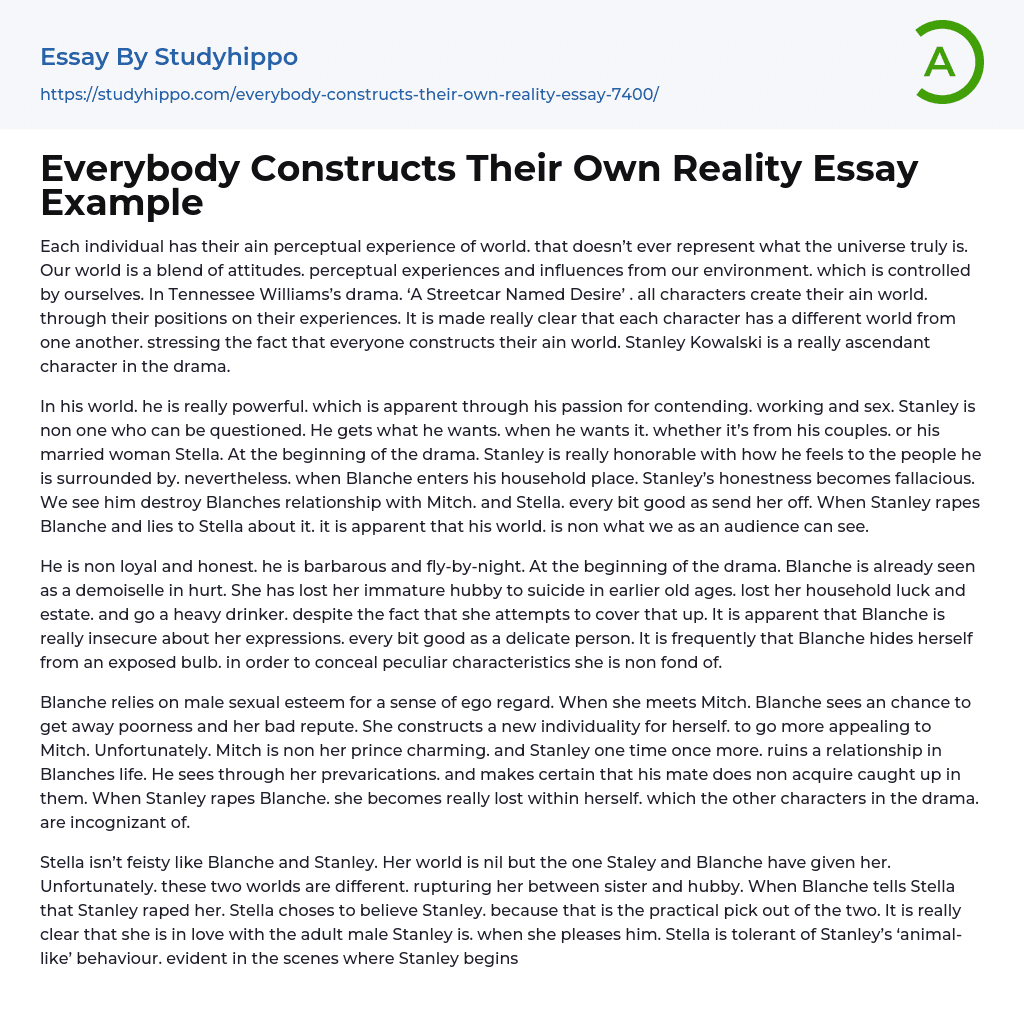Each individual's perception of reality may not always reflect the true nature of the world. Our attitudes, experiences, and influences from the environment shape our world. In Tennessee Williams's play, "A Streetcar Named Desire," characters construct their own worlds based on their perspectives and experiences. Each character has a unique worldview, emphasizing that everyone creates their own reality.
Stanley Kowalski, a dominant character in the play, prioritizes fighting, working, and sex in his powerful world. He is unwavering in his desires and doesn't tolerate questioning. Stanley always gets what he wants from friends or his wife Stella. Initially honest with those around him, Stanley becomes deceptive when Blanche enters his home.
Stanley destroys Blanche's relationships with Mitch and Stella and eventually drives her away. His rape of Blanche and lies to Stell
...a reveal that his world isn't as it appears – lacking loyalty and honesty while displaying a cruel nature.
From the beginning of the play, Blanche is depicted as a vulnerable woman who has faced significant hardships such as losing her young husband to suicide and her family's fortune and property. Insecure about her heavy drinking habits, she tries to hide them.
The text discusses the character of Mitch in A Streetcar Named Desire and how he is portrayed as more sensitive and mature compared to Stanley and other men. This may be attributed to his caretaking role for his sick mother. When Mitch meets Blanche, he sees an opportunity to love again and acts like a prince for her by bringing flowers and showing gentlemanly gestures. However, Stanley reveals Blanche's false identity to Mitch, which breaks his heart. Ultimately, Mitch chooses reality over fantasy and lets Blanch
go. She often hides from the light to conceal her flaws, relies on male attention for self-esteem, tries to create a new identity to appeal to him when she meets Mitch but is disappointed by him while Stanley ruins their relationship by exposing her lies. After being raped by Stanley, Blanche becomes lost within herself while the other characters remain unaware of her struggle. Stella is not confrontational like Blanche and Stanley; she accepts the reality they have created for her instead. When Blanche tells Stella about the rape, Stella chooses to believe Stanley because it is the practical choice given her love for him. She tolerates Stanley's aggressive behavior even when he loses his temper and sides with his version of reality over Blanche's. The play explores how each character creates their own reality based on their experiences and influences from their surroundings, serving as a reflection of the real world
- A Doll's House essays
- A Midsummer Night's Dream essays
- A raisin in the sun essays
- A Streetcar Named Desire essays
- An Inspector Calls essays
- Death of a salesman essays
- Everyman essays
- Fences essays
- Hamlet essays
- Hedda Gabler essays
- Iago essays
- King Lear essays
- Macbeth essays
- Much ado about nothing essays
- Oedipus Rex essays
- Oedipus The King essays
- Othello essays
- Pygmalion essays
- Romeo And Juliet essays
- Tartuffe essays
- The glass menagerie essays
- The Importance of Being Earnest essays
- The Merchant Of Venice essays
- The Taming of The Shrew essays
- Twelfth Night essays
- Waiting For Godot essays
- Acceptance essays
- Age Of Enlightenment essays
- Child Observation essays
- Confucianism essays
- Conscience essays
- Critical Reflection essays
- Destiny essays
- Determinism essays
- Empiricism essays
- Environmentalism essays
- Epistemology essays
- Ethics essays
- Ethos essays
- Existence essays
- Existentialism essays
- Fate essays
- Free Will essays
- Functionalism essays
- Future essays
- Good And Evil essays
- Human Nature essays
- Individualism essays
- Meaning Of Life essays
- Metaphysics essays




